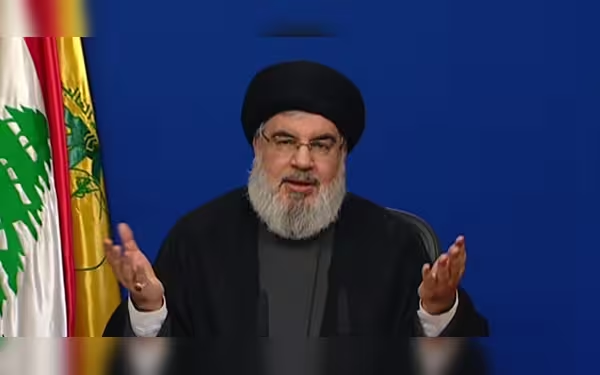Saturday, October 5, 2024 10:33 PM
Nasrallah Assassination: A Turning Point for Middle East Stability
- Nasrallah's killing may shift regional power dynamics.
- Israel's military strategy faces significant risks.
- Potential for wider conflict looms after the assassination.
 Image Credits: asiatimes
Image Credits: asiatimesThe assassination of Hassan Nasrallah raises questions about Israel's military strategy and the potential for wider conflict in the Middle East.
The recent assassination of Hassan Nasrallah, the longtime leader of Hezbollah, has sent shockwaves through the Middle East. Israeli Prime Minister Benjamin Netanyahu has hailed this event as a significant victory, claiming it will alter "the balance of power in the region for years to come." However, while this may sound promising, the reality of the situation is more complex than it appears.
Netanyahu's decision to order the strike against Nasrallah is seen as a personal triumph for him. It allows him to take direct responsibility for a high-profile action that could bolster his image as a protector of Israel's security. This is particularly important given the challenges he has faced in maintaining public trust. Yet, the aftermath of this assassination raises several critical questions.
One of the most pressing inquiries is whether Israel will proceed with a ground invasion of Hezbollah in Lebanon. If such an invasion occurs, it could be at a time when Hezbollah is particularly vulnerable. Recent Israeli attacks have severely disrupted Hezbollah's communications, targeting their pagers and walkie-talkies. Additionally, Israel has successfully eliminated eight of Hezbollah's nine senior military commanders, significantly weakening the group's leadership.
To capitalize on this moment, Israel must act decisively. The opportunity to dismantle Hezbollah's infrastructure and its arsenal of approximately 150,000 missiles, rockets, and drones is critical. However, the risks are substantial. Hezbollah is not a small force; it claims to have around 100,000 fighters, although U.S. intelligence estimates suggest the number is closer to 40,000 to 50,000. This still represents a formidable military presence.
Moreover, if Israeli ground forces enter southern Lebanon, they could face significant resistance. Reports indicate that Hezbollah has developed an extensive network of tunnels in the border area, which could be used to launch surprise attacks against Israeli troops. The potential for serious losses on both sides is a real concern.
While the assassination of Hassan Nasrallah may appear to be a victory for Israel, it is essential to consider the broader implications. The situation remains fluid, and the potential for escalation into a wider conflict looms large. As the region watches closely, the actions taken in the coming days and weeks will be crucial in determining whether this event will lead to a more stable Middle East or ignite further hostilities. The stakes are high, and the world is waiting to see how this complex situation unfolds.













